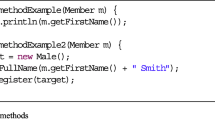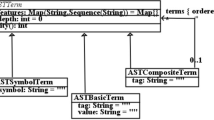Abstract
In recent years a great effort has been devoted to understanding the nature of model transformations. As a result, several mechanisms to improve model transformation languages have been proposed. Phasing has been mentioned in some works as a rule scheduling or organization mechanism, but without any detail. In this paper, we present a phasing mechanism in the context of rule-based transformation languages. We explain the structure and the behavior of the mechanism, and how it can be integrated in a language. We also analyze how the mechanism promotes modularity, internal transformation composition and helps to solve usual transformation problems. Besides, we show several examples of application to illustrate the usefulness of the mechanism.
Similar content being viewed by others
References
Belaunde, M.: Transformation Composition in QVT. In: Proceedings of the First European Workshop on Composition of Model Transformations, pp. 45–52 (2006)
Cleenewerck, T., Kurtev, I.: Separation of concerns in translational semantics for dsls in model engineering. In: SAC ’07: Proceedings of the 2007 ACM Symposium on Applied Computing, pp. 985–992. ACM Press, New York (2007)
Compuware Optimal J.: Available online: http://www.compuware.com (2005)
Czarnecki K., Helsen S (2006) Feature-based survey of model transformation approaches. IBM Syst. J. 45(3): 621–645
de Lara, J, Vangheluwe, H.: Atom3: A tool for multi-formalism and meta-modelling. In: European Joint Conference on Theory and Practice of Software (FASE), pp. 174–188 (2002)
Filman R.E., Elrad T., Clarke S., Aksit M. (2004) Aspect-Oriented Software Development. Addison-Wesley, Reading
Goran, J.O., Olsen, K., Jan Aagedal.: Aspects of reusable model transformations. In: Proceedings of the First European Workshop on Composition of Model Transformations, pp. 27–32 (2006)
Jouault, F., Kurtev, I.: Transforming models with ATL. In: Proceedings of the Model Transformations in Practice Workshop at MoDELS 2005, Montego Bay, Jamaica (2005)
Kleppe, A.: MCC: A model transformation environment. In: 2nd European Conference on Model Driven Architecture. Lecture Notes in Computer Science, pp. 173–187 (2006)
Kurtev, I.: Adaptability of model transformations. PhD Thesis, University of Twente, ISBN 90-365-2184-X (2005)
Kurtev, I., van den Berg, K., Jouault, F.: Rule-based modularization in model transformation languages illustrated with ATL. In: Proceedings of the 2006 ACM Symposium on Applied Computing (SAC’06), pp. 1202–1209. ACM Press, Dijon (2006)
Lawley, M., Duddy, K., Gerber, A., Raymond, K.: Language features for re-use and maintainability of MDA transformations. In: OOPSLA Workshop on Best Practices for Model-Driven Software Development, Vancouver, Canada (2004)
Lawley, M., Steel, J.: Practical declarative model transformation with Tefkat. In: Model Transformations in Practice Workshop, Montego Bay, Jamaica (2005)
Meyer, B.: Object-Oriented Software Construction, 2nd edn. Prentice-Hall, Englewood Cliffs (MEY b 88:1 2.P-Ex) (1997)
Object Management Group: MDA Guide version 1.0.1. omg/2003-06-01, OMG document (2003)
OMG. Final adopted specification for MOF 2.0 Query/View/Transformation. http://www.omg.org/docs/ptc/05-11-01.pdf (2005)
Sánchez, J.: García, J. A plugin-based language to experiment with model transformations. In 9th International Conference on Model Driven Engineering Languages and Systems. Lecture Notes in Computer Science, vol. 4199, pp. 336–350 (2006)
Sánchez, J., García, J. Menarguez, M., Ruby, T.L.: A practical, extensible transformation language. In: 2nd European Conference on Model Driven Architecture. Lecture Notes in Computer Science, vol. 4066, pp. 158–172 (2006)
Taentzer, G. Agg: a graph transformation environment for modeling and validation of software. In: Applications of Graph Transformations with Industrial Relevance (AGTIVE), pp. 446–453 (2003)
Tarr, P., Ossher, H., Harrison, W., Sutton, S.M.: N degrees of separation: multi-dimensional separation of concerns. In: ICSE ’99: Proceedings of the 21st international conference on Software Engineering, pp. 107–119. IEEE Computer Society Press Los Alamitos, CA (1999)
van Wijngaardeen, J.v.: Visser, E.: Program transformation mechanics: a classification of mechanisms for program transformation with a survey of existing transformation systems. Technical Report, Utrecht University (2003)
Varró D, Balogh A (2007) The model transformation language of the viatra2 framework. Sci Comput Program 68(3): 187–207
Wageelar, D.: Blackbox composition of model transformations using domain-specic modelling languages. In: Proceedings of the First European Workshop on Composition of Model Transformations, pp. 21–26 (2006)
Warmer, J.: Octel, a template language for generating structures instead of textstreams. In: Proceedings of the First European Workshop on Composition of Model Transformations, pp. 47–50 (2006)
Author information
Authors and Affiliations
Corresponding author
Additional information
Communicated by Dr. Jean Bezivin.
Rights and permissions
About this article
Cite this article
Cuadrado, J.S., Molina, J.G. Modularization of model transformations through a phasing mechanism. Softw Syst Model 8, 325–345 (2009). https://doi.org/10.1007/s10270-008-0093-0
Received:
Revised:
Accepted:
Published:
Issue Date:
DOI: https://doi.org/10.1007/s10270-008-0093-0




